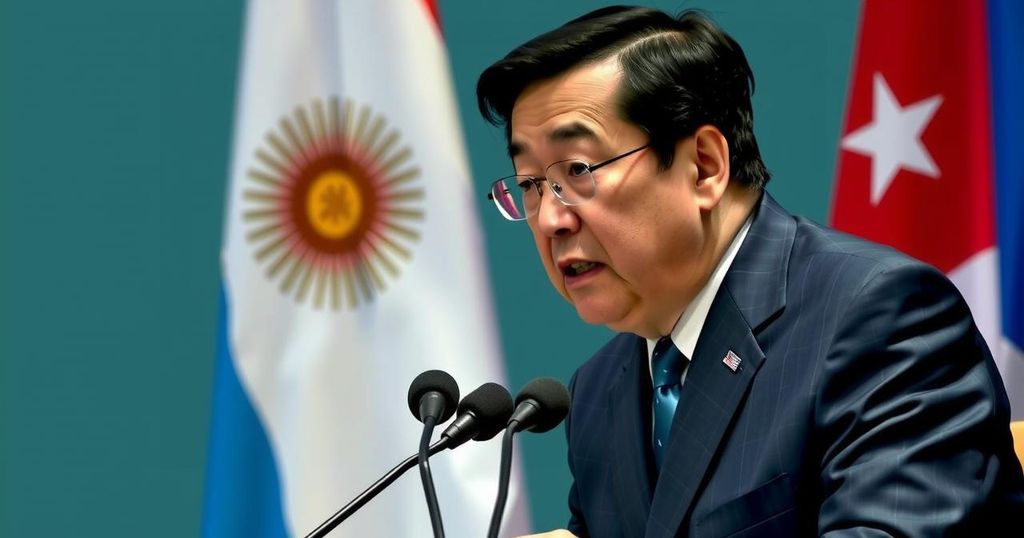Argentine President Javier Milei Replaces Foreign Minister Following Pro-Cuba Vote

Argentine President Javier Milei dismissed Foreign Affairs Minister Diana Mondino after she voted to lift the U.S. embargo against Cuba at the U.N. This decision underscores Milei’s pro-U.S. stance and rejection of leftist governments’ influence in Argentina. Gerardo Werthein has been appointed as her successor.
On Wednesday, Argentine President Javier Milei dismissed Foreign Affairs Minister Diana Mondino following her endorsement of a United Nations resolution advocating for the cessation of the U.S. embargo on Cuba. This decision underscores President Milei’s firm alignment with pro-United States sentiments and his disapproval of leftist regimes within Latin America, notably Cuba and Venezuela. During a U.N. General Assembly meeting, the resolution to end the long-standing sanctions against Cuba received broad support, with only the United States and Israel voting against it. President Milei, who has expressed intent to align Argentina’s foreign policy more closely with U.S. and Israeli interests, publicly commended his administration for “not supporting nor being an accomplice of dictators,” reinforcing his position through sharing a lawmaker’s praise on social media. Gerardo Werthein, who has held the position of Argentina’s ambassador to the United States, will succeed Mondino as the new foreign minister, as announced by presidential spokesperson Manuel Adorni via X. Mondino had previously been instrumental in maintaining Argentina’s diplomatic relations despite President Milei’s controversial remarks regarding nations such as Brazil and China. Confusion arose after a conversation between President Milei and Ambassador Werthein, in which the president expressed his dissatisfaction regarding Argentina’s vote to lift the embargo against the Cuban government. Tensions between Argentina and Cuba have been further inflamed by recent actions, such as the state-owned energy company YPF’s refusal to supply fuel to Cubana, Cuba’s national airline, which forced it to discontinue a long-standing route connecting Havana and Buenos Aires. During the announcement of her dismissal, it became evident that President Milei’s administration would prioritize firm alignment with U.S. policies over previous engagements with left-leaning governments in the region.
The recent dismissal of Foreign Minister Diana Mondino by Argentine President Javier Milei reflects significant shifts in Argentina’s foreign policy under his administration. Elected in late 2023, Milei has openly favored strengthening ties with the United States and has adopted a cautious approach towards leftist governments, particularly in Latin America, which he perceives as aligned with adversarial positions against U.S. interests. The recent resolution from the U.N. General Assembly, calling for an end to the embargo against Cuba, directly contradicted Milei’s objectives, illustrating a growing divide between his government’s intentions and the broader diplomatic landscape within the region.
In summary, President Javier Milei’s decision to terminate Foreign Affairs Minister Diana Mondino highlights his administration’s unwavering commitment to pro-U.S. policies and a rejection of engagements that may appear sympathetic towards leftist regimes such as Cuba. The overwhelming U.N. vote to lift the U.S. embargo against Cuba has intensified this diplomatic rift, prompting a strategic reorientation within Argentina’s foreign affairs under Milei’s leadership. As the new foreign minister, Gerardo Werthein will likely continue to navigate the delicate balance of international relations while aligning more closely with U.S. interests.
Original Source: www.hindustantimes.com






